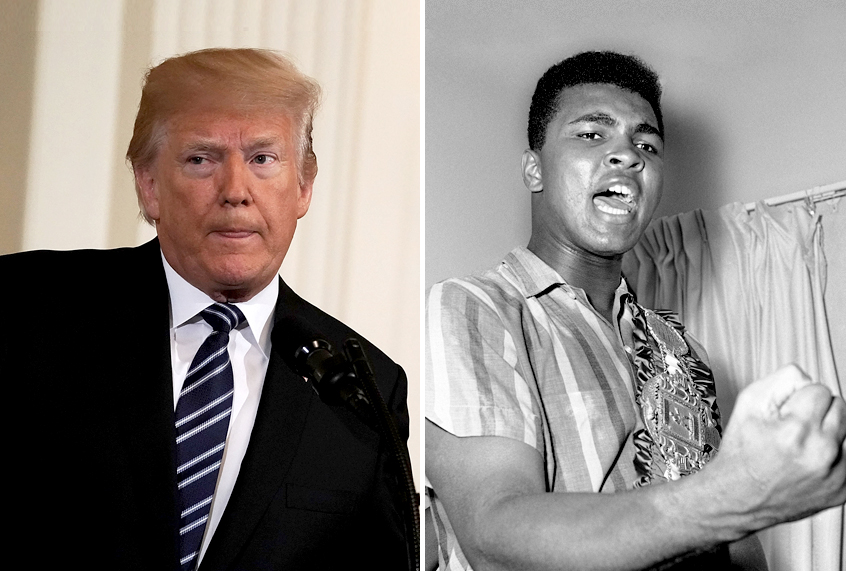Donald Trump, who has been chafing for a year-and-a-half under the realization that presidents aren’t kings, has discovered, much to his delight, that there is one monarchical power the president holds: the unlimited ability to pardon people for federal crimes. He’s been ramping up his use of it, largely in service of his twin goals to troll liberals and convince himself he’s a real celebrity instead of a pathetic striver.
Trump has pardoned villains of various stripes, including Joe Arpaio, Dinesh D’Souza and Scooter Libby. He also pardoned the truly deserving Alice Johnson, a woman locked up for decades for a nonviolent crime, but clearly only did it so fellow reality TV star Kim Kardashian would pretend to like him. He issued a posthumous pardon to boxer Jack Johnson for essentially the same reason, to compel Sylvester Stallone to say nice things about him in public.
Now Trump has told reporters he’s “thinking about Muhammad Ali” for a pardon. As Ali’s estate promptly noted, this is entirely unnecessary, since Ali’s conviction for draft-dodging was overturned by the Supreme Court in 1971.
This whole story was largely covered in the media as one of Trump’s impulsive flights of fancy, especially as Trump’s stated reason for it — “He was not very popular then, his memory is very popular now” — is even more dim-witted than most of the things he says, hard as that may be to believe.
But Trump’s impulse to inject himself into Ali’s enduring legacy, in truth, is far darker and cleverer than that. Trump is, in essence (and as usual), trolling. He’s exploiting Ali’s memory to stick a thumb in the eye of the contemporary left and create a narrative on the right about his magnanimous nature that will ultimately serve his racist ends.
It’s important to place this hypothetical pardon of Ali in context. For most of his presidency, Trump has been publicly obsessing about black NFL players who exercise their right to peaceful protest by kneeling during the national anthem before football games. In large part, this reflects his own personal racism — there’s little doubt that Trump becomes unhinged at the sight of black people failing to show the deference he feels is his due. But it’s also because, as he has repeatedly told people, he feels that stoking this issue fires up his base. Even if players aren’t kneeling, he will pretend they are when he needs, say, a distraction from the Russia investigation.
Ali, of course, is the historical analogue to the kneeling football players of today. He was roundly demonized by conservatives in his day for his outspoken opposition to the Vietnam War, and his conversion to Islam was initially not taken seriously by his critics or the mainstream media.
But all that was a long time ago. Ali is dead now and can’t speak for himself, which means Trump can use him as a weapon to demonize whatever black athlete or sportscaster he’s dangling in front of his racist base as a hate object. Trump is implicitly contrasting Ali’s actions in the 1960s with the protests of today, hinting that today’s protesters are ungrateful punks compared to someone like Ali. By musing publicly about this, he’s inviting talk-radio hosts and Fox News anchors to argue that the anthem kneelers of today are somehow dishonoring Ali’s memory.
Trump didn’t invent this tactic. Last year, I called it the “dead progressive” strategy, and it’s been used by conservatives for decades, if not longer. The argument, sometimes explicit and sometimes more coded, is that progressive activists of the past were working on real issues, but those today are a bunch of entitled whiners who are supposedly betraying the hard work of those who came before. It allows reactionaries to paint themselves as reasonable people with humanitarian values, without actually have to embrace either reason or humanity.
Martin Luther King Jr., who was reviled by the right in his day, is now frequently cited by conservatives who love to claim that if he were alive today he might identify with the right or at least reject contemporary “identity politics” activism. Abolitionist Frederick Douglass is also frequently exploited in this way. There’s a right-wing organization named after him, and commentator George Will has claimed that Douglass would support the Republican economic policies that have enshrined racial inequality in the United States.
Feminist icon Susan B. Anthony, who never married or had children herself, has been reborn in the right-wing imagination as a gender traditionalist who believed childbirth should be mandatory for women. One of the most prominent anti-woman organizations in the country, the anti-abortion SBA List, was named after Anthony by the same kind of religious-right misogynists who opposed her during her lifetime.
Trump is a big fan of this kind of trolling, of course. Trump likes to talk up the fact that Abraham Lincoln was a Republican, which is obvious bad faith and reflects zero understanding of the history of America’s two-party system since then. In any case, Trump made it clear in his remarks after Charlottesville that his true allegiance lies more with the Confederate cause, supported at the time by pro-slavery Democrats.
Ali died two years ago this month. Even by the past standards of your typical trolling right-winger, that likely feels a bit soon for this kind of metaphorical grave-robbing. But now that Trump has opened the door, we can expect to see more right-wing pundits and politicians invoking Ali’s name to discredit the courage and integrity of living people who stand up to racism and injustice.


